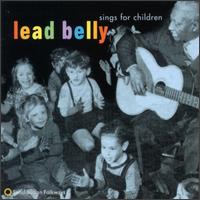
- Format: MP3

As the liner notes explain, Leadbelly didn't limit the repertoire of his performances for children solely to simple tunes, also putting in blues and folk songs that you wouldn't think of as kids' tunes...The result is a disc that is simply a good Leadbelly album, whether listened to by kids or others.]
Don't let the title of this album fool you--it's just a marketing ploy, and god only knows who thinks that trying to sell Leadbelly to children might be where the gold lays. I went out to buy my first Leadbelly album, having been an enormous fan of his from the solo and duet cuts I'd heard of his on various Woody Guthrie albums. The reason I chose this one wasn't because I wanted to have a children's sing along, it was because as I read the various reviews of the massive output of Leadbelly compilatons that's been going on at a very fast clip since his death, "Leadbelly Sings for Children" had one of the best song lists, plus best reviews of most of what was out there.
They do manage to work in some children asking Mr. Leadbelly some questions, and very occasionaly they even sing along, but make no mistake about it, this has nothing to do with children. It's simply the Leadbelly album that offers the most high quality bang for your buck--28 songs, recorded in the 40's. I would think children would in fact be quite bewildered about a great deal of what Leadbelly is singing about, such as racism, injustice, what it's like to be a slave, and ancient hymnals that he can sing like no other.
For those who don't know Leadbelly's story, there's an excellent movie that was made quite awhile ago that's very moving. But in a nutshell, he was imprisoned on a chain gang for an insanely long time for a trumped up charge, until his fame as a musician playing for the other prisoners reached the warden's ears, which eventually reached the governer, and got Leadbelly a pardon. Once out, he eventually hooked up with his greatest admirer, Woody Guthrie. What Woody and Folkways both recognized was that Leadbelly was one of the last carriers of the lineage of Black folk music--I once remembered reading the number of songs that he knew and Asch recorded for posterity, as they literally had been mostly forgotten, except for Leadbelly's knowledge of them--he was a living, singing encycloepedia of the old songs of the slaves--spirituals, honky tonks, and he was all on his own an amazing songwriter. With the help of influential friends like Asch, Guthrie, and Pete Seeger, Leadbelly got the attention he so richly deserved before he died, after having lived a life largely filled with great injustice. But the one place it seems he was always utterly free was within his music, and even the chain gang couldn't take that away from him. He's a great hero in how he lived his life, his dignified response to the ongoing racism he encountered (Bougouis Blues chronicles this in both a hilarious and makes you made as hell way--he has a good laugh at all the racists, but just listening to it makes you want to go back in time and kick some racist butt! :)
Anyhow, this is a wonderful and thorough collection to get introduced to Leadbelly's music. And again, if I hadn't read the reviews I did, I would never have picked up an album entitled "Sings for Children," but the reviews made it perfectly clear that was just a marketing angle, and these songs are in fact appropriate for anyone of any age who appreciates a genius who was as brilliant with his guitar as he was with his voice, and songwriting. Leadbelly was a one and only, and to hear him is to hear the history of the U.S. South--both its evils and what the slaves managed to create out of their suffering--a music that is as uplifting as it is soulful. Enjoy!
====================================
All Music Guide Review by Richie Unterberger 5* of 5*
A dozen of these 28 songs were first issued on the 1960 Folkways album Negro Folk Songs for Young People. But this is not so much a CD expansion of that album as a lengthy compilation of children-friendly performances from the 1940s that uses Negro Folk Songs for Young People as its core. The additional tracks were recorded by Moe Asch of Folkways in 1941-1948, and include five of the six songs released on the 1941 album Play Parties in Song and Dance as Sung by Lead Belly, and a previously unreleased radio broadcast of "Take this Hammer." While many of these are simple tunes that can easily be picked up by young kids for singing along to, like "Skip to My Lou" and "Blue-Tailed Fly (Jimmy Crack Corn)," a bunch of these are classic folk songs of equal appeal to all age groups. Some of them are particularly identified with Leadbelly's interpretations, such as "Rock Island Line," "John Henry," "Cotton Fields," "Midnight Special," "Pick a Bale of Cotton" and "Take this Hammer"; other familiar standards like "Swing Low, Sweet Chariot" and "Sally Walker" are also aboard. As the liner notes explain, Leadbelly didn't limit the repertoire of his performances for children solely to simple tunes, also putting in blues and folk songs that you wouldn't think of as kids' tunes, like "Good Morning Blues." The result is a disc that is simply a good Leadbelly album, whether listened to by kids or others.